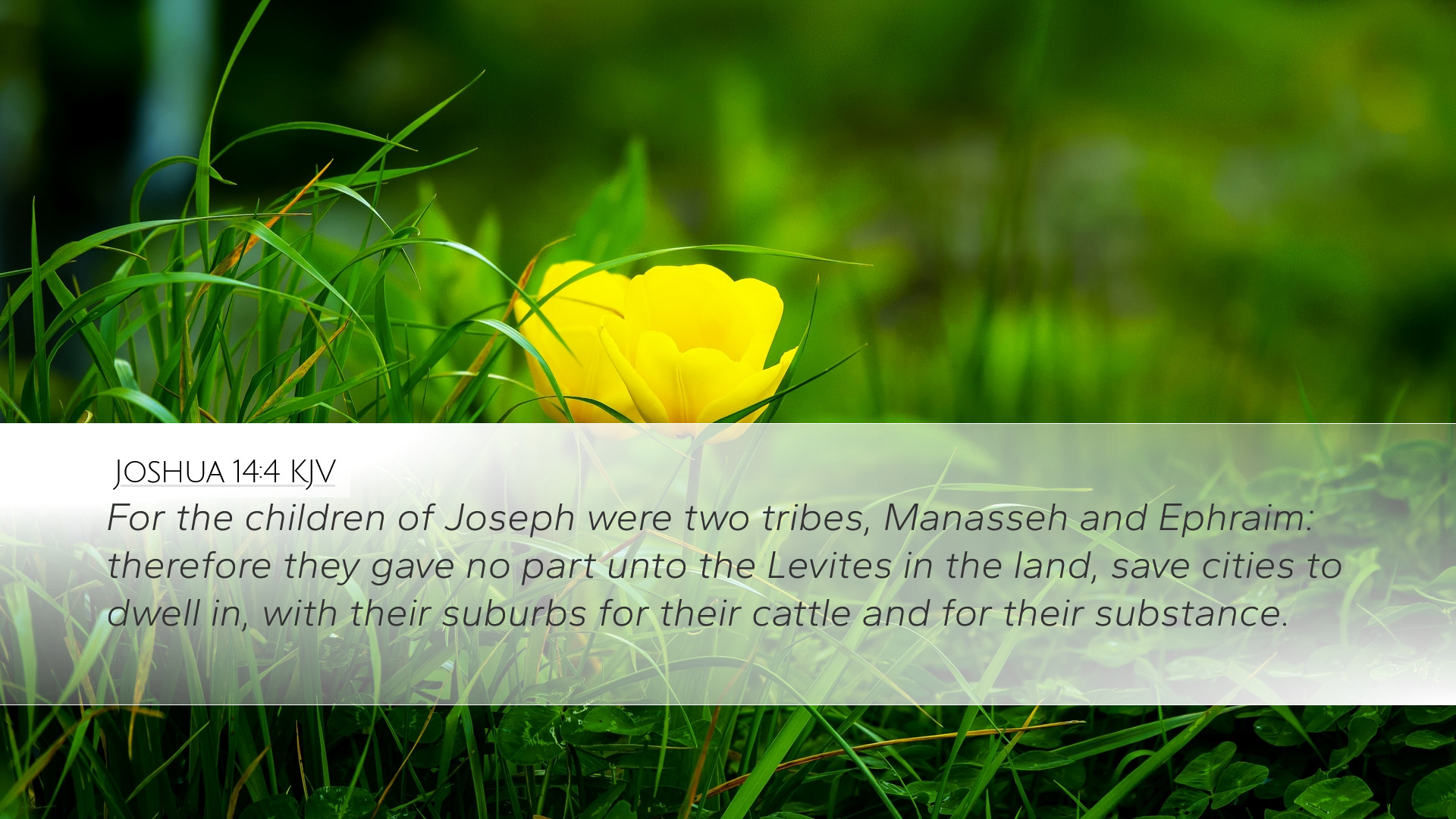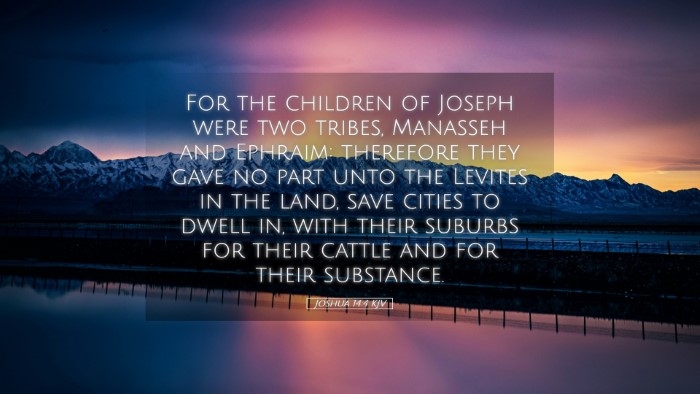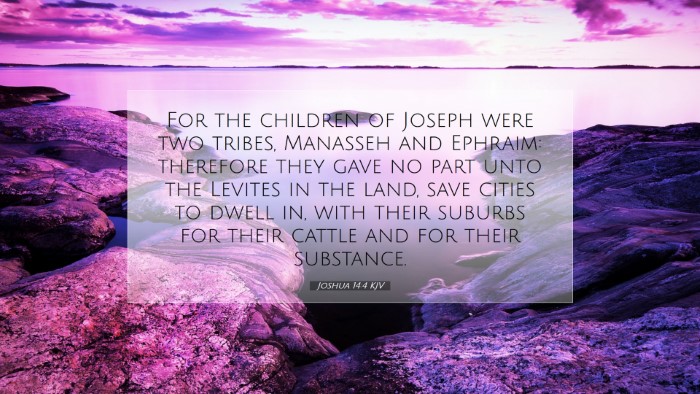Old Testament
Genesis Exodus Leviticus Numbers Deuteronomy Joshua Judges Ruth 1 Samuel 2 Samuel 1 Kings 2 Kings 1 Chronicles 2 Chronicles Ezra Nehemiah Esther Job Psalms Proverbs Ecclesiastes Song of Solomon Isaiah Jeremiah Lamentations Ezekiel Daniel Hosea Joel Amos Obadiah Jonah Micah Nahum Habakkuk Zephaniah Haggai Zechariah MalachiJoshua 14:4
Joshua 14:4 KJV
For the children of Joseph were two tribes, Manasseh and Ephraim: therefore they gave no part unto the Levites in the land, save cities to dwell in, with their suburbs for their cattle and for their substance.
Joshua 14:4 Bible Commentary
Commentary on Joshua 14:4
Text of Joshua 14:4 (KJV): "For the children of Joseph were two tribes, Manasseh and Ephraim: therefore they gave no part unto the Levites in the land, save cities to dwell in, with their suburbs for their cattle and for their substance."
Introduction
This verse serves as a pivotal point in understanding the distribution of land among the tribes of Israel, highlighting the distinct nature of the Levites' inheritance as compared to the other tribes. The children of Joseph are mentioned specifically here to underscore the blessings bestowed upon them, which significantly influenced the overall division of the Promised Land.
Historical Context
This text is embedded within the narrative of the Israelites' conquest and settlement of Canaan under Joshua's leadership. It reflects the unique status of the Levites, who were set apart for religious service, possessing no territorial inheritance among the other tribes, but instead receiving cities to dwell in.
Insights from Public Domain Commentaries
Matthew Henry's Commentary
Matthew Henry observes that the division of the land among the tribes is indicative of God's providence and wisdom in fulfilling His promises. Henry emphasizes that despite the entitlement of the Joseph tribes, the priority of the Levites was to be maintained through their cities. He notes that the Levites, although not receiving a land inheritance, still played an essential role in the worship and spiritual guidance of the nation, highlighting their special calling and purpose.
Albert Barnes' Notes on the Bible
Barnes stresses the significance of the distinction of the Levites. He clarifies that this verse illustrates how the Tribe of Levi was not allotted land as others were, yet they were provided with specific cities throughout the other tribes' territories. This arrangement ensured that the Levites could serve the spiritual needs of all Israel, thus fulfilling their divine commission. Barnes also points out that the mention of the Joseph tribes, particularly Manasseh and Ephraim, indicates their considerable number and prominence, leading to them receiving larger portions of land.
Adam Clarke's Commentary
Adam Clarke elaborates on the division of Joseph's descendants into two distinct tribes, Ephraim and Manasseh. He notes that this division was a fulfillment of Jacob's blessings and a response to the growth of Joseph's lineage in Egypt. Clarke highlights that the Levites were sustained by God through their special role and responsibilities, emphasizing that their lack of land did not equate to a lack of provision. He remarks on the importance of the Levites' cities as strategic places for worship and cultural preservation.
Thematic Insights
- The Role of the Levites:
The Levites represent a people set apart for a divine purpose, illustrating the theme of spiritual leadership within the community. They were entrusted with the responsibilities of the sanctuary, showing that spiritual inheritance is often distinct from material possessions.
- Land as a Divine Gift:
This verse reinforces the notion that the land is a divine gift and that its distribution reflects God’s will. Joseph's tribes' prominence in the land division underscores God's blessings and providence over His people.
- Spiritual vs. Material Wealth:
The contrast between the material wealth of the Joseph tribes and the spiritual wealth of the Levites invites deeper reflection on what constitutes true prosperity in God's economy. The Levites' sustenance through the cities provided them with a unique kind of wealth—one founded on devotion and ministry.
Practical Applications
The implications of Joshua 14:4 extend beyond historical analysis to present-day application for pastors, students, and scholars:
- Recognition of Spiritual Leadership: Leaders within the church can draw parallels to the Levites, understanding that their roles, though distinct from the laity, serve an essential purpose in the well-being of the congregation.
- Emphasizing Community Support: Just as the Levites were provided cities, modern communities should seek to support their spiritual leaders adequately, recognizing the need for them to thrive in their callings.
- Valuing Spiritual Heritage: This passage serves as a reminder that spiritual inheritance is as valuable as physical inheritance; believers are encouraged to nurture their relationship with God as a vital part of their identity and calling.
Conclusion
The verse in Joshua 14:4 encapsulates significant theological themes pertinent to the understanding of God’s covenant with His people. Through the lens of various commentaries, we appreciate the layers of meaning regarding the division of the land, the unique role of the Levites, and the implications for contemporary faith practice. It challenges us to reassess our values and priorities in light of God’s eternal promises, reminding us that spiritual service and leadership are not only vital for a thriving community of faith but are also honored by God in unique ways.


